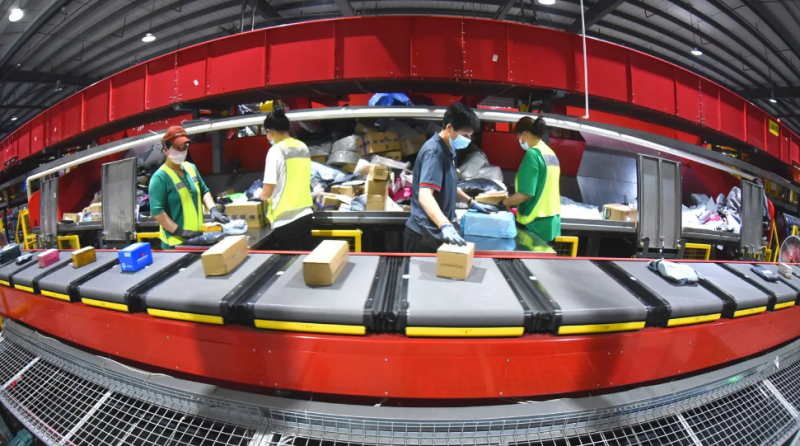[ad_1]
What explains this sudden explosion in relative wealth and technological power? What happens if it slows down, or stalls?
And if so, can we do something about it? These are the key questions of “progress studies”, an academic field and self-styled newborn intellectual movement, which aims to unravel the causes of human progress to better advance it.
Founded by an influential economist and billionaire entrepreneur, this community tends to determine progress in terms of scientific or technological advancement and economic growth – and therefore their ideas and beliefs are not without criticism. So what does the progress studies movement believe and what do they want to see happen in the future?
One of the first ways to understand the progress studies movement is to understand its fears.
In recent years, a number of scholars and economists have raised concerns that scientific and technological progress may be slowing down, which they worry will cause economic growth to stagnate.
To be closer to this, Gordon invites his readers to reflect on the degree of progress between the late mid-20th century and the 2020s.

Imagine after that first nap as a typical American, you got a second nap in 1940, waking up in the 2020s. Your fridge now has a freezer and your new microwave lets you reheat your food.
It is much more likely to own a car now, and it is safer and easier to travel. You have a computer, TV and smartphone. These are impressive inventions, and some seem like magic, but over time, you realize that living standards have not transformed as much as when you woke up in 1940.
Gordon claims that the dizzying changes in the U.S. of 1870-1970 were built on transformative, one-time innovations, and therefore Americans can not expect similar levels of growth to return quickly.
The extraordinary thing is “not that growth is slowing down, but that it was so fast for so long,” he writes.
According to Gordon, this slowdown is not anyone’s fault: American growth slowed after 1970 not because the inventors had lost their spark or had no new ideas, but because the basic elements of a modern standard of living had already been achieved. along so many dimensions.

Gordon draws on the fear made famous by economist Tyler Cowen in his 2011 book. Cowen similarly argues that the US ate most of the “blessed fruit” that enabled sustained revenue growth. US average and that the country can not wait to grow as before.
So are all the ‘fruits’ gone? Are “ideas” getting harder to find?
A team of economists from Stanford and MIT posed exactly this question in a 2020 paper.
They found that research and development efforts have increased significantly, while productivity for researchers has declined. In other words, we are getting less for our time and money. A lot less. In his analysis of the paper, MacAskill estimates that each duplication of technological advancement requires four times more research effort than the previous duplication.

Are “ideas” getting harder to find?
Why? Some of the progress community point to funding bureaucracies, which eat up almost half of researchers’ time and create perverse incentives.
This may explain part of the decline, but the authors found that U.S. search productivity has fallen more than 40 times since 1930.
Is it credible that US scientific funding has been made many less efficient?
Instead, the authors favor the arguments of Gordon and Cowen: We have found simple discoveries and have now made more efforts for what is left. For example, compare the knowledge that Albert Einstein did as a patent officer, or that Marie Curie opened in a rudimentary lab, with multibillion-dollar megaprojects like the Large Hadron Collider or the James Webb Space Telescope.
We have partially offset this decline by increasing the percentage of the population heading towards research, but this, of course, cannot continue forever. Global population growth may help, but this is expected to slow and then change before the end of the century.

It is also possible that artificial intelligence (AI) may help reverse the decline – or even initiate a new era of growth, but some researchers fear that superintelligent AI could bring other risks that impair progress, or worse.
The stagnation hypothesis is not universally accepted. Ideas can be combined and recombined, creating a combinatorial burst of new innovations, an effect that counteracts the ‘swallowing of easy-to-catch fruits’. And some have pointed out that if you measure the productivity and benefits of research in different ways, the picture is much more rosy.
However, the fear of stagnation is a central motive for many people in the progressive community. Unlike Gordon, however, they are optimistic about their ability to change that, which leads us to the story of how the progress studies movement was founded.
The future of progress studies
Cowen and Collison subtly refer to the famous quote from Karl Marx: Philosophers have interpreted the world only in different ways. The point, however, is to change that. ” Regardless of the name, then, they are not content with just studying progress; want action. (Cowen says Marx was “obsessed with the study of progress.”)
In February, Crawford outlined his vision for a thriving progressive movement in the next 10 years, hoping, among other things, for the academic recognition of progress studies as a valuable interdisciplinary field and a curriculum of progress studies in every school. secondary in the world.

Crawford sees progress studies as much more than a political movement, saying: “I think the change we need is on a much deeper, philosophical level. “
After all, the progressive community wants its followers to believe they can do better. Numerous sources paraphrased the slogan “a better world is possible”.
Crawford says: I want humanity to regain its self-esteem and ambition, to reach figuratively towards the stars. I want us to dream about flying machines, fusion energy, nanotechnology, terraforming planets, exploring the galaxy. So, it is not only about politics, but about the basic attitudes of people towards humanity and our country in nature. “
If you fall asleep for another 70 years, can the world of Crawford wait for you? Would you live a happier and richer life? Maybe. But whether you see this vision as progress or not will probably depend on your definition of what progress really means. BBC
top channel
[ad_2]
Source link















